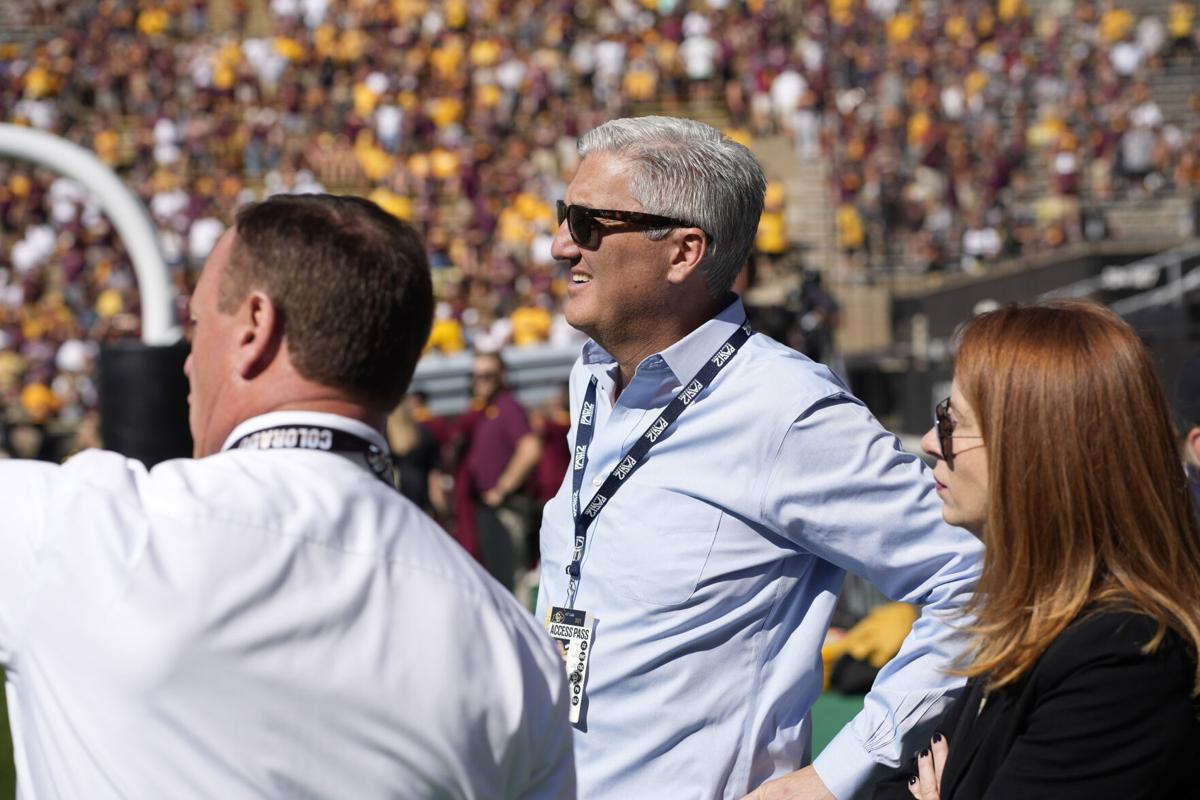On May 13, 2021, George Kliavkoff was appointed the seventh commissioner of the Pac-12 Conference.
To mark the one-year anniversary and gain insight into Kliavkoff’s performance, the Hotline reached out to three university presidents who helped lead the hiring process: Oregon’s Michael Schill, Washington’s Ana Mari Cauce and Washington State’s Kirk Schulz. (Together, they form the Pac-12 executive committee, with Schill serving as chair.)
Here are Schill’s comments:
How would you assess Kliavkoff’s performance since his tenure began on July 1?
A: “George has had a terrific year. I’ve used the expression about intercollegiate athletics hurtling towards the future, and I can’t imagine anyone I’d rather hurtle with than George.
“He’s thoughtful, humble, intelligent. He sees way down the line. He has a tremendous work ethic. He’s transparent. He’s warm. He’s very strategic in setting us up for success. George makes me and the other members of the search committee look like geniuses every day.”
What tangible impact has Kliavkoff made?
A: “He has changed the narrative of negativity around the Pac-12 and really brought people together.
“It’s very hard for an organization to make progress when there’s only criticism out there, when you are constantly defending, constantly rehabilitating. It’s one step forward and one back, and there’s no progress. I’m not saying that (media) narrative was wrong, but it’s nice not to have that media narrative.
“He won the first day. He got us all to like him and have that level of confidence that he had the skill set for what it would take to be successful. He has increased morale at the Pac-12 and increased the number of positive stories about the Pac-12.”
What is Kliavkoff’s role in shaping the future of the conference?
A: “He has thought strategically about the future. Do I have confidence, and do other presidents and chancellors have confidence that he’s the right person to lead us in a tremendously turbulent time?
“I don’t mean that our media contracts will be bigger than the SEC’s or that we will win every championship. But George is going to optimize the Pac-12 and be an influential thought leader in where intercollegiate athletics goes. I have great confidence with him at the helm.
“I don’t think any of us see the Pac-12 as a passive entity. We have a brand. We care about students. We care about academic integrity. We’re not win-at-all-costs. We care about Olympic sports. We care about women’s sports. We care about racial justice.
“Most people would agree the Pac-12 embodies all that in ways that are greater than a lot of other conferences. And I think people would say the same about the Big Ten.
“We want to make sure that wherever we end up, wherever the Power Five goes, that our values lead the process, and we want George to be a player in shaping the future of intercollegiate athletics.”
How do you see the Pac-12 navigating the era of name, image and likeness?
A: “Are we going to have a system that makes sense in an academic environment and treats people fairly, that’s value-driven and economically sustainable? A lot of those questions are up in the air.
“Many of us think there’s a need for congressional action with guardrails. How can we have competition when the rules are different in every state? We need the government to establish uniform rules and sensible rules.
“George needs to be helping drive that process. We need to be smart, have the right values, the right ideas.”
Kliavkoff told the Hotline in January that he planned to have an ongoing dialogue with the presidents and chancellors about the importance of investing in football. Do you sense the message is resonating? What does it mean in a palpable sense?
A: “He’s continuing to talk about the importance of investing in football, largely because football is the engine for all intercollegiate sports. He’s very articulate about that.
“It’s a complicated question, because universities are in very different places in terms of the resources they have available. I don’t want to get specific about any school, but one could make the argument that head coaching salaries are out of control.”





